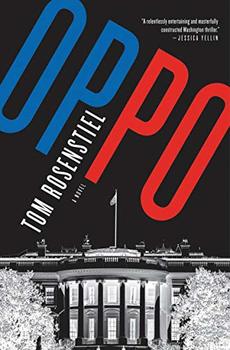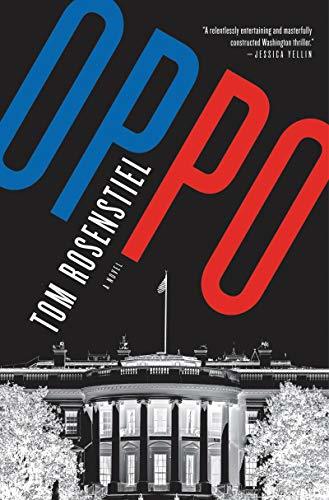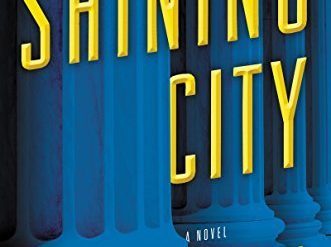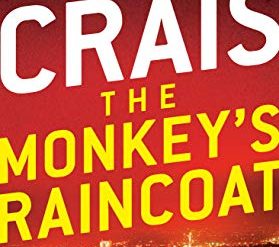
Lies, conspiracy theories, dirty tricks, and attack ads represent the ugly side of politics to the public at large. But the down-and-dirtiest aspects of election campaigns today emerge from political opposition research, or “oppo” in the jargon of the trade. In hopes of uncovering some hidden scandal in the life of an opposing candidate, a campaign enlists the aid of a law firm or specialized consulting company. Lawyers, private eyes, former spies, hackers, or other practiced investigators then go to work, digging deeply into the candidate’s history. And to protect themselves, candidates often order up their own, internal opposition research to learn what an opponent might discover. The process is brought vividly to the foreground in Tom Rosenstiel’s troubling 2019 political thriller, Oppo.
Estimated reading time: 5 minutes
A moderate U.S. Senator is blackmailed
It’s February in a presidential election year. “The Iowa caucuses and New Hampshire primary had finally happened, followed by Nevada and South Carolina.” Super Tuesday is three weeks off. And the suspense in Oppo kicks off when a highly regarded moderate Republican Senator receives word of a blackmail attempt. A donor in her home state of Arizona explains to her chief of staff that someone is threatening to drive her out of office by revealing a terrible secret if she agrees to run for vice president. Senator Wendy Upton has, in fact, been offered the number two slot by two candidates.
Oppo (Peter Rena #3) by Tom Rosenstiel (2019) 336 pages ★★★★☆

A familiar political mood
One of the candidates is a disagreeable Right-Wing Republican Upton has long tangled with in the Senate. The other is a middle-of-the-road billionaire who invites her to make history with a bipartisan campaign. He is a Democrat. Both men are front-runners, although the Republican is losing his lead to another “conservative” who is even more rabidly Right-Wing than he is. In other words, the picture he paints looks very familiar even though few of the individual characters closely resemble real-world figures. (The sole exceptions are that Right-Wing Senator, who could be Ted Cruz, and his closest rival, who smells a lot like Donald Trump.)
The personalities and issues and events are scrambled in this novel, but the portrayal of America’s mood in 2020 is picture-perfect. As Rosenstiel writes, “The public was dissatisfied with the country—not just politics. They were beginning to doubt whether America worked as an experiment. They were angry about their lives. They were angry about the people who disagreed with them. The whole notion of governing by letting everyone vote seemed broken.” And, later, one of Rosenstiel’s characters muses, “In the era of networked connectivity, foreign manipulation of social media, corporations without borders, and a global economy, maybe eighteenth-century notions of democracy had run their course.”
A political opposition research firm is at the center of the action
Although the story revolves around Senator Upton, the protagonists of this novel, like its two prequels, are Peter Rena and Randi Brooks. They’re the partners in a Washington-based consulting firm that offers security, research, and related services, mostly to corporate clients. Brooks is a Democrat and passionate about politics, Rena a Republican former Special Forces soldier who steers the firm away from political campaigns. But he has little choice when his long-time mentor, a senior United States Senator, summons him and Brooks to a meeting with Wendy Upton. And soon the two are off in a breakneck effort to learn who is blackmailing the Senator and why. They have less than a week to uncover the answers.
Rosenstiel steadily builds suspense throughout. Along the way he surveys the contemporary political scene with a practiced eye. Billionaire-funded SuperPACS. Rigidly ideological Republican candidates. The ever-present threat of violence on the campaign trail. And political opposition research. Campaigns & Elections‘ website lists seventeen opposition research firms that have paid for placement, but Rosenstiel reports there are hundreds of such firms today, “probably 150 in D.C. alone.”
About the author

Tom Rosenstiel is the author of several nonfiction books on journalism as well as three novels about “political fixers” Peter Rena and Randi Brooks. Rosenstiel has been a journalist for more than thirty years. He is also a press critic, executive director of the American Press Institute, and a non-resident senior fellow at the liberal-leaning Brookings Institution.
For related reading
Check out The five best novels about politics.
For a review of three other Peter Rena novels, see:
- Shining City (Peter Rena #1) (An insider’s view of Washington politics)
- The Good Lie (Peter Rena #2) (An insightful Washington political thriller)
- The Days to Come (This new President tries to address climate change)
You’ll find other insightful novels about American politics at:
- Echo House by Ward Just (Who wields the real power in Washington, DC?)
- Landfall by Thomas Mallon (A novelist’s sympathetic portrait of George W. Bush)
- Finale: A Novel of the Reagan Years by Thomas Mallon (Ronald Reagan deconstructed in a new novel)
You might also be interested in Top 10 nonfiction books about politics and The top 5 books about Donald Trump and his impact on American democracy.
And you can always find my most popular reviews, and the most recent ones, on the Home Page.


























